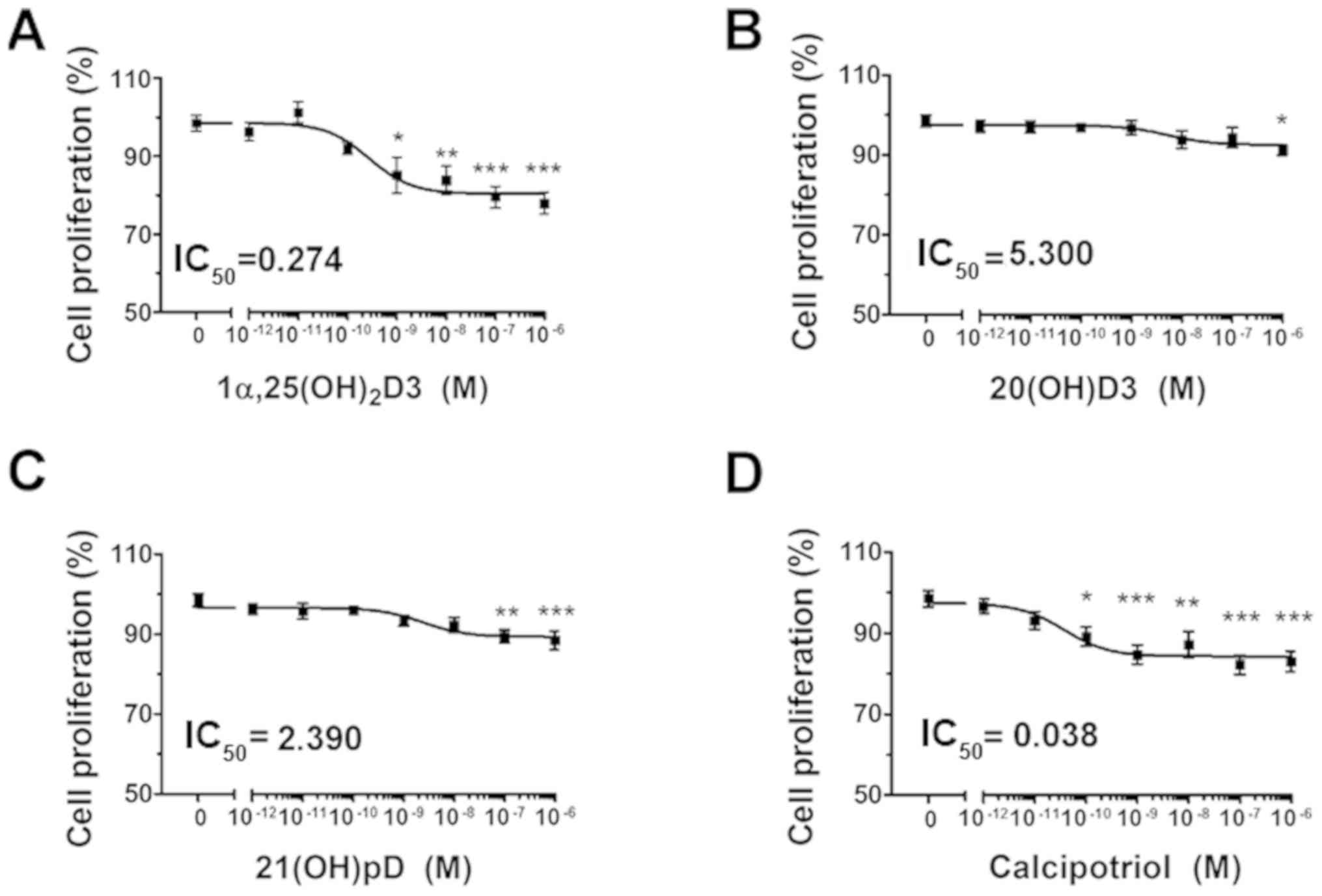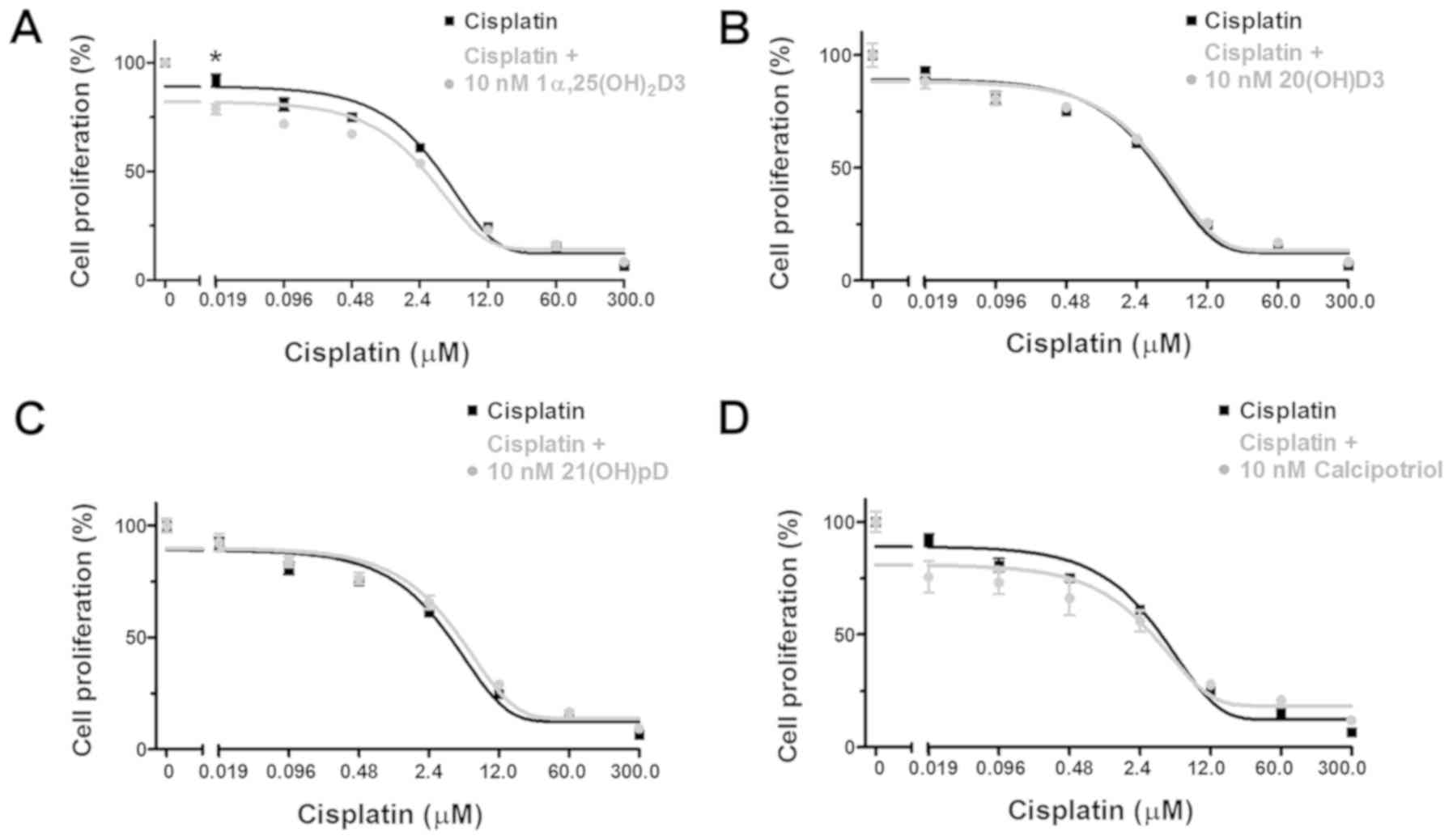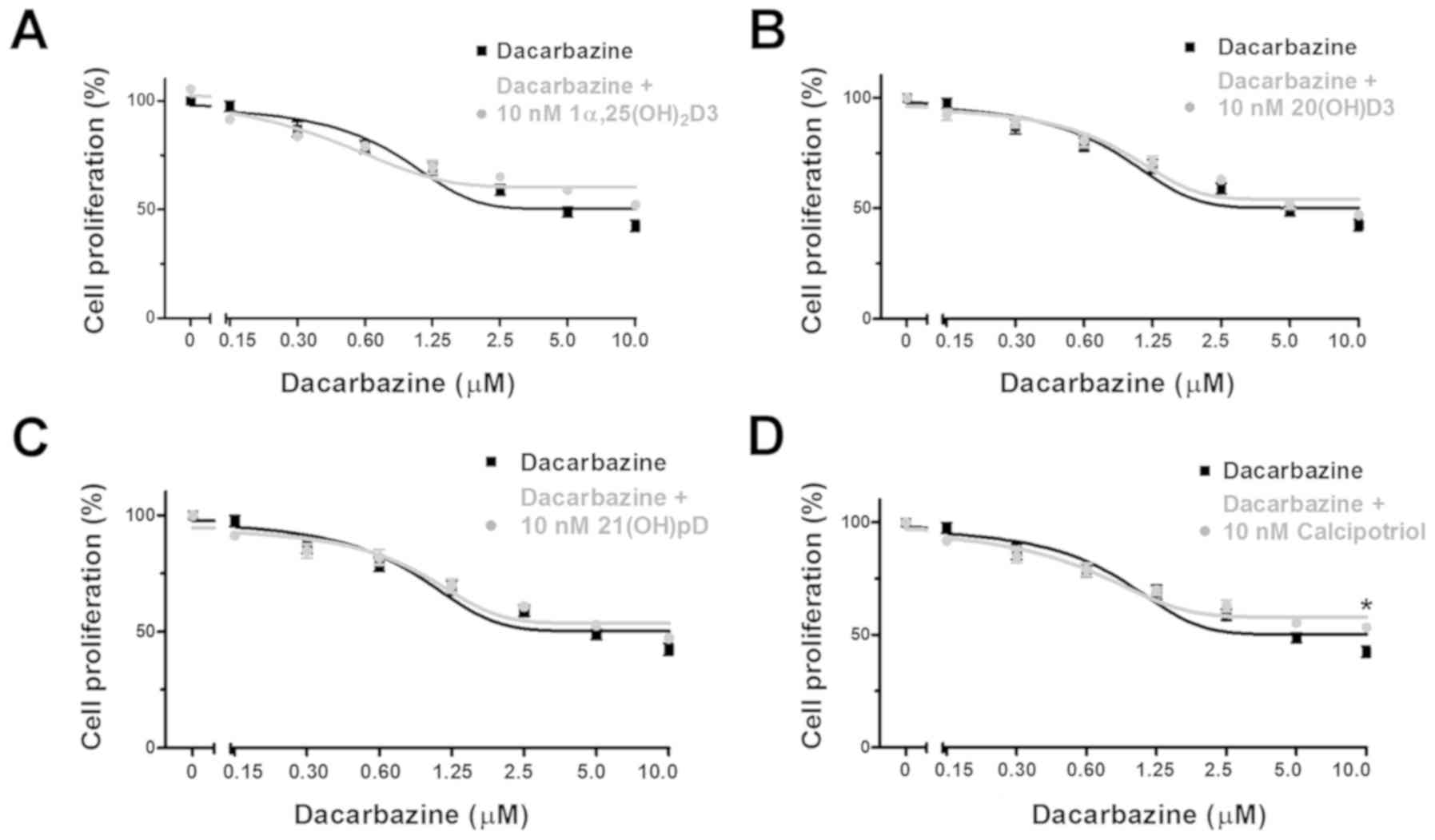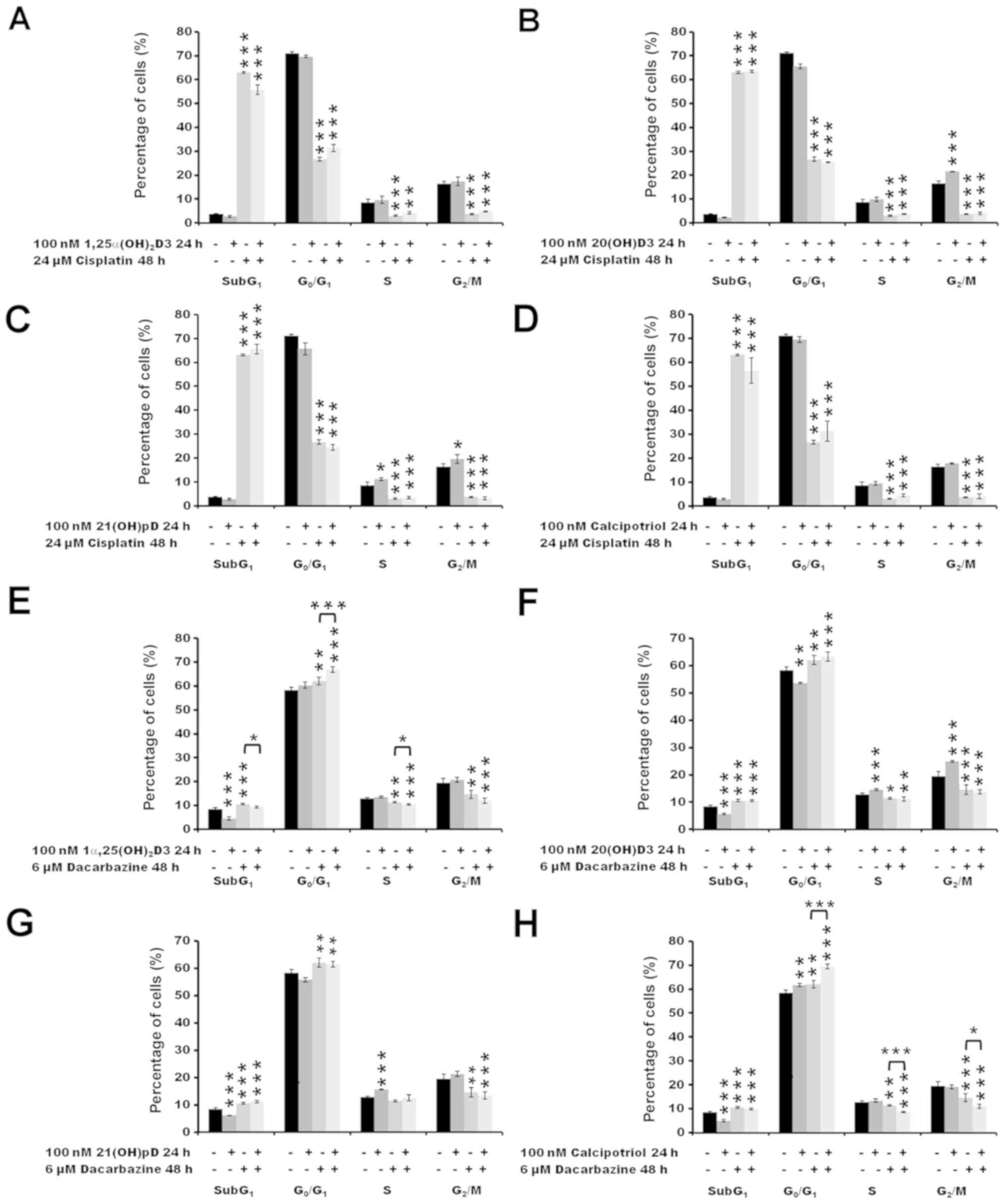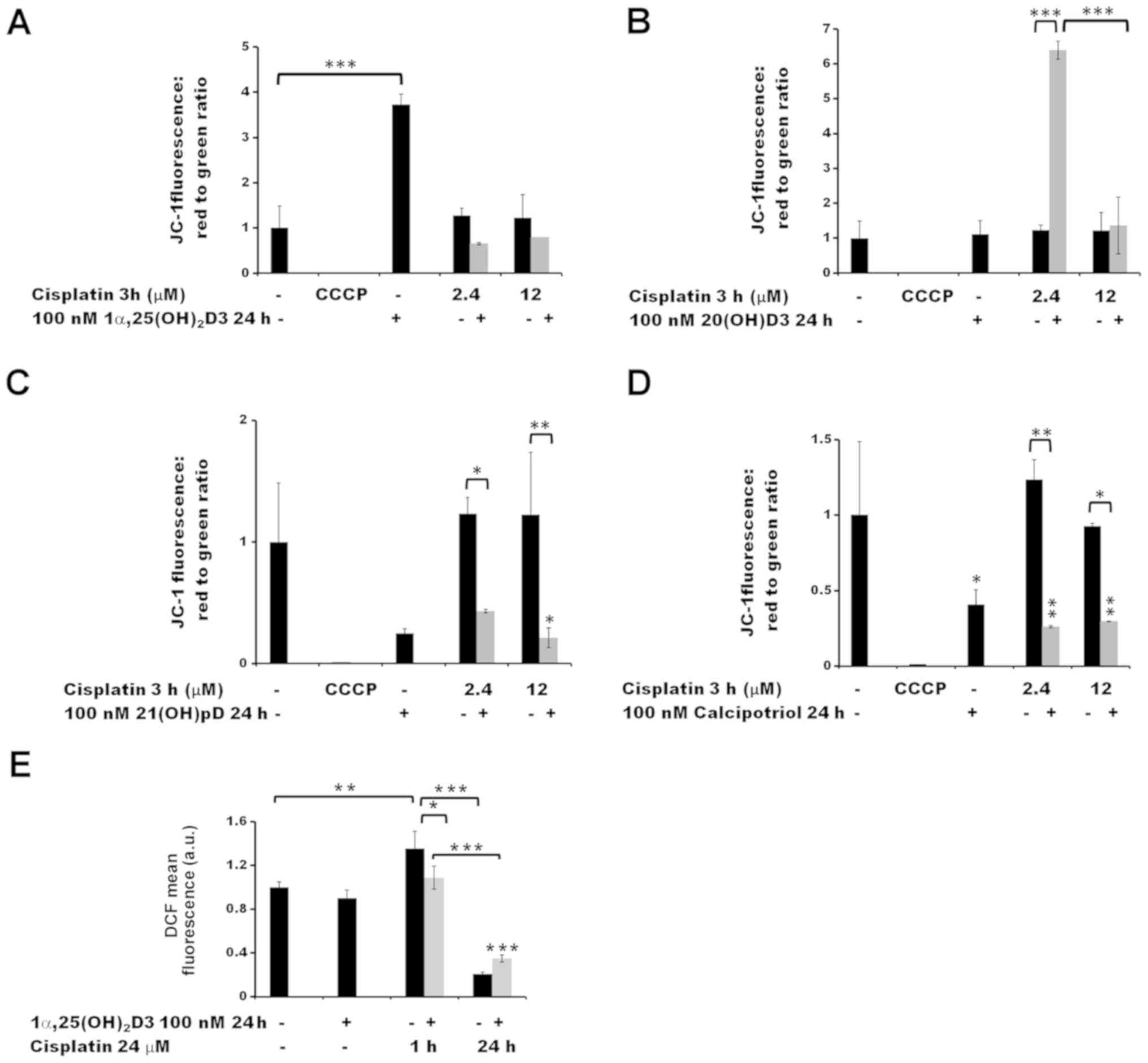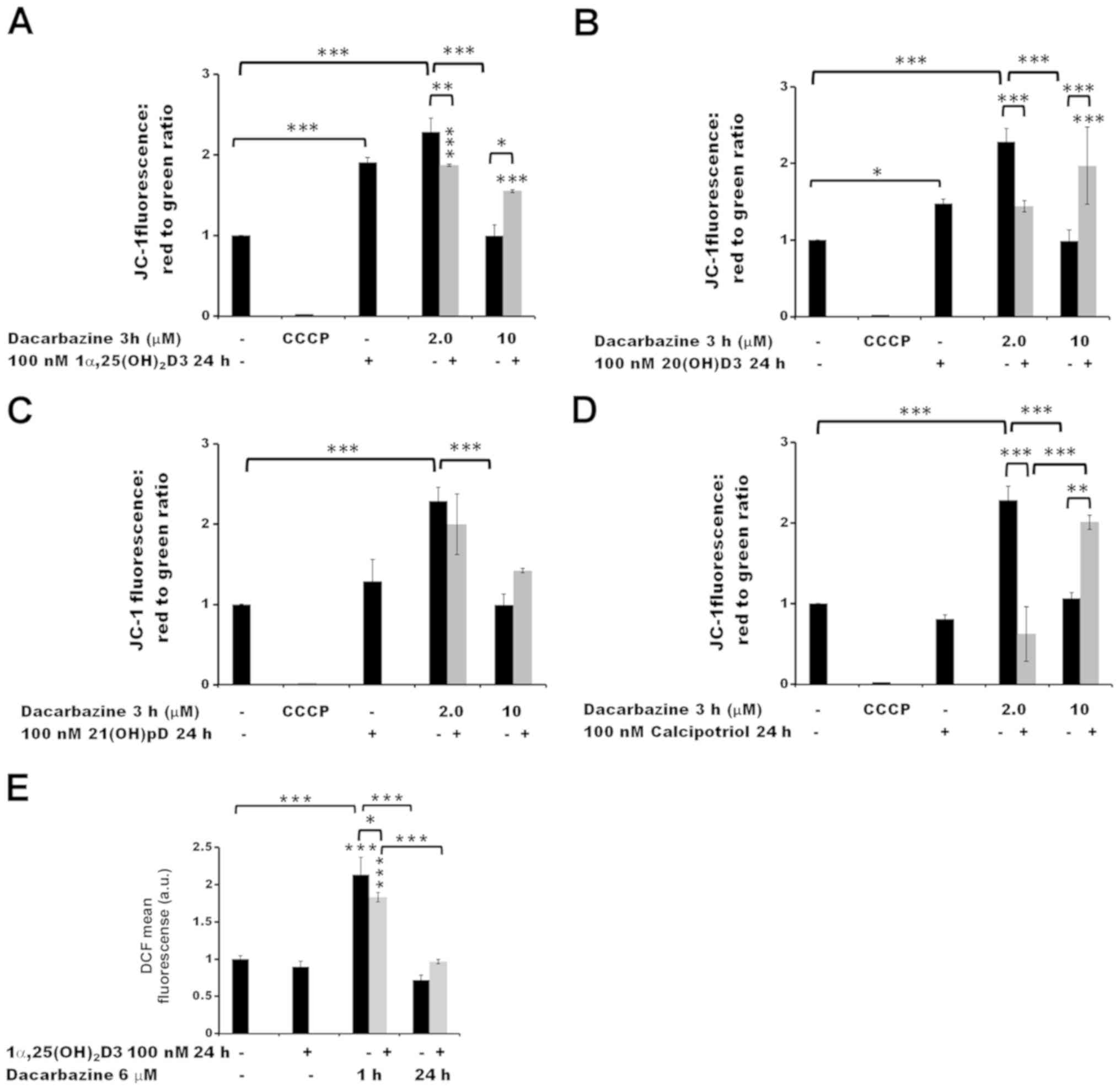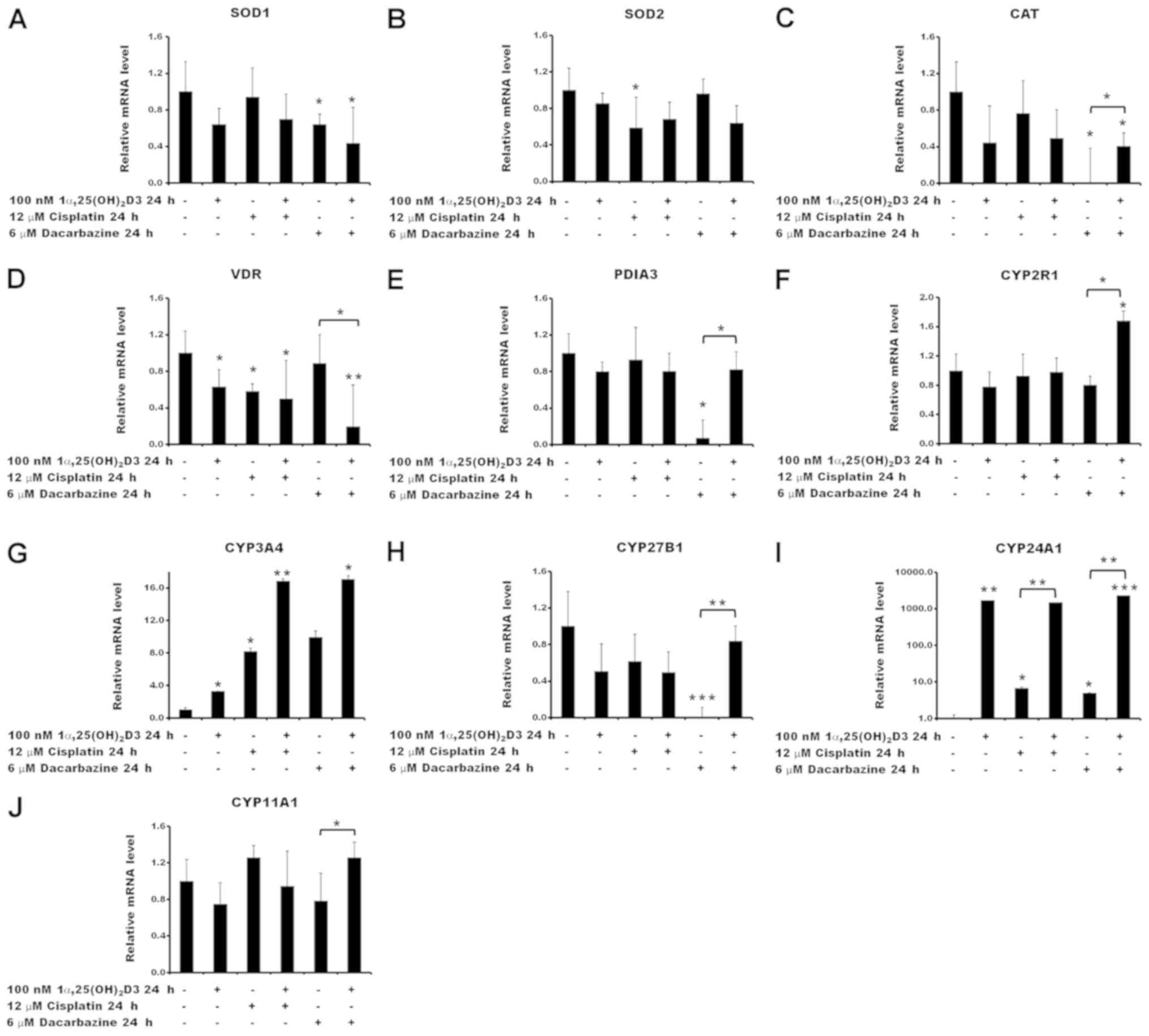|
1
|
Piotrowska A, Wierzbicka J and Żmijewski
MA: Vitamin D in the skin physiology and pathology. Acta Biochim
Pol. 63:17–29. 2016. View Article : Google Scholar : PubMed/NCBI
|
|
2
|
Holick MF: Vitamin D: Evolutionary,
physiological and health perspectives. Curr Drug Targets. 12:4–18.
2011. View Article : Google Scholar
|
|
3
|
Bikle DD: Vitamin D and the skin:
Physiology and pathophysiology. Rev Endocr Metab Disord. 13:3–19.
2012. View Article : Google Scholar
|
|
4
|
Samuel S and Sitrin MD: Vitamin D’s role
in cell proliferation and differentiation. Nutr Rev. 66(Suppl 2):
S116–S124. 2008. View Article : Google Scholar : PubMed/NCBI
|
|
5
|
Bikle DD: Vitamin D regulated keratinocyte
differentiation. J Cell Biochem. 92:436–444. 2004. View Article : Google Scholar : PubMed/NCBI
|
|
6
|
Kubis AM and Piwowar A: The new insight on
the regulatory role of the vitamin D3 in metabolic pathways
characteristic for cancerogenesis and neurodegenerative diseases.
Ageing Res Rev. 24(Pt B): 126–137. 2015. View Article : Google Scholar : PubMed/NCBI
|
|
7
|
Slominski AT, Janjetovic Z, Kim TK,
Wasilewski P, Rosas S, Hanna S, Sayre RM, Dowdy JC, Li W and Tuckey
RC: Novel non-calcemic secosteroids that are produced by human
epidermal keratinocytes protect against solar radiation. J Steroid
Biochem Mol Biol. 148:52–63. 2015. View Article : Google Scholar : PubMed/NCBI
|
|
8
|
Gordon-Thomson C, Gupta R, Tongkao-on W,
Ryan A, Halliday GM and Mason RS: 1α,25 dihydroxyvitamin D3
enhances cellular defences against UV-induced oxidative and other
forms of DNA damage in skin. Photochem Photobiol Sci. 11:1837–1847.
2012. View Article : Google Scholar : PubMed/NCBI
|
|
9
|
Fedirko V, Bostick RM, Long Q, Flanders
WD, McCullough ML, Sidelnikov E, Daniel CR, Rutherford RE and
Shaukat A: Effects of supplemental vitamin D and calcium on
oxidative DNA damage marker in normal colorectal mucosa: A
randomized clinical trial. Cancer Epidemiol Biomarkers Prev.
19:280–291. 2010. View Article : Google Scholar : PubMed/NCBI
|
|
10
|
Jiang YJ, Teichert AE, Fong F, Oda Y and
Bikle DD: 1α,25(OH)2-dihydroxyvitamin D3/VDR protects the skin from
UVB-induced tumor formation by interacting with the β-catenin
pathway. J Steroid Biochem Mol Biol. 136:229–232. 2013. View Article : Google Scholar
|
|
11
|
Dixon KM, Deo SS, Wong G, Slater M, Norman
AW, Bishop JE, Posner GH, Ishizuka S, Halliday GM, Reeve VE, et al:
Skin cancer prevention: A possible role of 1,25dihydroxyvitamin D3
and its analogs. J Steroid Biochem Mol Biol. 97:137–143. 2005.
View Article : Google Scholar : PubMed/NCBI
|
|
12
|
Wong G, Gupta R, Dixon KM, Deo SS, Choong
SM, Halliday GM, Bishop JE, Ishizuka S, Norman AW, Posner GH, et
al: 1,25-Dihydroxyvitamin D and three low-calcemic analogs decrease
UV-induced DNA damage via the rapid response pathway. J Steroid
Biochem Mol Biol. 89–90:567–570. 2004. View Article : Google Scholar
|
|
13
|
Bikle DD, Jiang Y, Nguyen T, Oda Y and Tu
CL: Disruption of Vitamin D and Calcium Signaling in Keratinocytes
Predisposes to Skin Cancer. Front Physiol. 7:2962016. View Article : Google Scholar : PubMed/NCBI
|
|
14
|
Holick MF: Sunlight, ultraviolet
radiation, vitamin D and skin cancer: How much sunlight do we need?
Adv Exp Med Biol. 810:1–16. 2014.PubMed/NCBI
|
|
15
|
Slominski AT, Brożyna AA, Skobowiat C,
Zmijewski MA, Kim TK, Janjetovic Z, Oak AS, Jozwicki W, Jetten AM,
Mason RS, et al: On the role of classical and novel forms of
vitamin D in melanoma progression and management. J Steroid Biochem
Mol Biol. 177:159–170. 2018. View Article : Google Scholar :
|
|
16
|
Yin L, Ordóñez-Mena JM, Chen T, Schöttker
B, Arndt V and Brenner H: Circulating 25-hydroxyvitamin D serum
concentration and total cancer incidence and mortality: A
systematic review and meta-analysis. Prev Med. 57:753–764. 2013.
View Article : Google Scholar : PubMed/NCBI
|
|
17
|
Reichrath J, Zouboulis CC, Vogt T and
Holick MF: Targeting the vitamin D endocrine system (VDES) for the
management of inflammatory and malignant skin diseases: An
historical view and outlook. Rev Endocr Metab Disord. 17:405–417.
2016. View Article : Google Scholar : PubMed/NCBI
|
|
18
|
Brożyna AA, Jóźwicki W, Janjetovic Z and
Slominski AT: Expression of the vitamin D-activating enzyme
1α-hydroxylase (CYP27B1) decreases during melanoma progression. Hum
Pathol. 44:374–387. 2013. View Article : Google Scholar
|
|
19
|
Brożyna AA, Jóźwicki W and Slominski AT:
Decreased VDR expression in cutaneous melanomas as marker of tumor
progression: New data and analyses. Anticancer Res. 34:2735–2743.
2014.
|
|
20
|
Ma Y, Trump DL and Johnson CS: Vitamin D
in combination cancer treatment. J Cancer. 1:101–107. 2010.
View Article : Google Scholar : PubMed/NCBI
|
|
21
|
Krishnan AV, Swami S and Feldman D:
Equivalent anticancer activities of dietary vitamin D and
calcitriol in an animal model of breast cancer: Importance of
mammary CYP27B1 for treatment and prevention. J Steroid Biochem Mol
Biol. 136:289–295. 2013. View Article : Google Scholar :
|
|
22
|
Morris HA: Vitamin D activities for health
outcomes. Ann Lab Med. 34:181–186. 2014. View Article : Google Scholar : PubMed/NCBI
|
|
23
|
Mitchell D: The relationship between
vitamin D and cancer. Clin J Oncol Nurs. 15:557–560. 2011.
View Article : Google Scholar : PubMed/NCBI
|
|
24
|
Welsh J, Wietzke JA, Zinser GM, Byrne B,
Smith K and Narvaez CJ: Vitamin D-3 receptor as a target for breast
cancer prevention. J Nutr. 133(Suppl): 2425S–2433S. 2003.
View Article : Google Scholar : PubMed/NCBI
|
|
25
|
Lamprecht SA and Lipkin M: Chemoprevention
of colon cancer by calcium, vitamin D and folate: Molecular
mechanisms. Nat Rev Cancer. 3:601–614. 2003. View Article : Google Scholar : PubMed/NCBI
|
|
26
|
Bolland MJ, Grey A, Gamble GD and Reid IR:
Calcium and vitamin D supplements and health outcomes: A reanalysis
of the Women’s Health Initiative (WHI) limited-access data set. Am
J Clin Nutr. 94:1144–1149. 2011. View Article : Google Scholar : PubMed/NCBI
|
|
27
|
Grant WB: 25-hydroxyvitamin D and breast
cancer, colorectal cancer, and colorectal adenomas: Case-control
versus nested case-control studies. Anticancer Res. 35:1153–1160.
2015.PubMed/NCBI
|
|
28
|
Płudowski P, Karczmarewicz E, Bayer M,
Carter G, Chlebna-Sokół D, Czech-Kowalska J, Dębski R, Decsi T,
Dobrzańska A, Franek E, et al: Practical guidelines for the
supplementation of vitamin D and the treatment of deficits in
Central Europe - recommended vitamin D intakes in the general
population and groups at risk of vitamin D deficiency. Endokrynol
Pol. 64:319–327. 2013. View Article : Google Scholar : PubMed/NCBI
|
|
29
|
Skobowiat C, Oak AS, Kim TK, Yang CH,
Pfeffer LM, Tuckey RC and Slominski AT: Noncalcemic
20-hydroxyvitamin D3 inhibits human melanoma growth in in vitro and
in vivo models. Oncotarget. 8:9823–9834. 2017. View Article : Google Scholar : PubMed/NCBI
|
|
30
|
Slominski AT, Brożyna AA, Zmijewski MA,
Jóźwicki W, Jetten AM, Mason RS, Tuckey RC and Elmets CA: Vitamin D
signaling and melanoma: Role of vitamin D and its receptors in
melanoma progression and management. Lab Invest. 97:706–724. 2017.
View Article : Google Scholar : PubMed/NCBI
|
|
31
|
Ma Y, Yu WD, Trump DL and Johnson CS:
1,25D3 enhances antitumor activity of gemcitabine and cisplatin in
human bladder cancer models. Cancer. 116:3294–3303. 2010.
View Article : Google Scholar : PubMed/NCBI
|
|
32
|
Rassnick KM, Muindi JR, Johnson CS,
Balkman CE, Ramnath N, Yu WD, Engler KL, Page RL and Trump DL: In
vitro and in vivo evaluation of combined calcitriol and cisplatin
in dogs with spontaneously occurring tumors. Cancer Chemother
Pharmacol. 62:881–891. 2008. View Article : Google Scholar : PubMed/NCBI
|
|
33
|
Wietrzyk J, Nevozhay D, Filip B, Milczarek
M and Kutner A: The antitumor effect of lowered doses of
cytostatics combined with new analogs of vitamin D in mice.
Anticancer Res. 27(5A): 3387–3398. 2007.PubMed/NCBI
|
|
34
|
Podgorska E, Drzal A, Matuszak Z, Swakon
J, Slominski A, Elas M and Urbanska K: Calcitriol and Calcidiol Can
Sensitize Melanoma Cells to Low(−)LET Proton Beam Irradiation. Int
J Mol Sci. 19:192018. View Article : Google Scholar
|
|
35
|
Piotrowska A, Wierzbicka J, Ślebioda T,
Woźniak M, Tuckey RC, Slominski AT and Żmijewski MA: Vitamin D
derivatives enhance cytotoxic effects of H2O2 or cisplatin on human
keratinocytes. Steroids. 110:49–61. 2016. View Article : Google Scholar : PubMed/NCBI
|
|
36
|
Saw RP, Armstrong BK, Mason RS, Morton RL,
Shannon KF, Spillane AJ, Stretch JR and Thompson JF: Adjuvant
therapy with high dose vitamin D following primary treatment of
melanoma at high risk of recurrence: A placebo controlled
randomised phase II trial (ANZMTG 02.09 Mel-D). BMC Cancer.
14:7802014. View Article : Google Scholar : PubMed/NCBI
|
|
37
|
Pettijohn E, Martone B, Rademaker A and
Kuzel T: A phase I study of high-dose calcitriol in combination
with temozolomide for patients with metastatic melanoma. J Pers
Med. 4:448–458. 2014. View Article : Google Scholar
|
|
38
|
Batus M, Waheed S, Ruby C, Petersen L,
Bines SD and Kaufman HL: Optimal management of metastatic melanoma:
Current strategies and future directions. Am J Clin Dermatol.
14:179–194. 2013. View Article : Google Scholar : PubMed/NCBI
|
|
39
|
Shah DJ and Dronca RS: Latest advances in
chemotherapeutic, targeted, and immune approaches in the treatment
of metastatic melanoma. Mayo Clin Proc. 89:504–519. 2014.
View Article : Google Scholar : PubMed/NCBI
|
|
40
|
Arnold M, de Vries E, Whiteman DC, Jemal
A, Bray F, Parkin DM and Soerjomataram I: Global burden of
cutaneous melanoma attributable to ultraviolet radiation in 2012.
Int J Cancer. 143:1305–1314. 2018. View Article : Google Scholar : PubMed/NCBI
|
|
41
|
Mattia G, Puglisi R, Ascione B, Malorni W,
Carè A and Matarrese P: Cell death-based treatments of
melanoma:conventional treatments and new therapeutic strategies.
Cell Death Dis. 9:1122018. View Article : Google Scholar : PubMed/NCBI
|
|
42
|
Slominski AT and Carlson JA: Melanoma
resistance: A bright future for academicians and a challenge for
patient advocates. Mayo Clin Proc. 89:429–433. 2014. View Article : Google Scholar : PubMed/NCBI
|
|
43
|
Russo A, Ficili B, Candido S, Pezzino FM,
Guarneri C, Biondi A, Travali S, McCubrey JA, Spandidos DA and
Libra M: Emerging targeted therapies for melanoma treatment
(Review). Int J Oncol. 45:516–524. 2014. View Article : Google Scholar : PubMed/NCBI
|
|
44
|
Siegel RL, Miller KD and Jemal A: Cancer
Statistics, 2017. CA Cancer J Clin. 67:7–30. 2017. View Article : Google Scholar : PubMed/NCBI
|
|
45
|
Johnson DB, Pollack MH and Sosman JA:
Emerging targeted therapies for melanoma. Expert Opin Emerg Drugs.
21:195–207. 2016. View Article : Google Scholar : PubMed/NCBI
|
|
46
|
Slominski AT, Kim TK, Li W, Yi AK,
Postlethwaite A and Tuckey RC: The role of CYP11A1 in the
production of vitamin D metabolites and their role in the
regulation of epidermal functions. J Steroid Biochem Mol Biol.
144(Pt A): 28–39. 2014. View Article : Google Scholar
|
|
47
|
Slominski AT, Janjetovic Z, Fuller BE,
Zmijewski MA, Tuckey RC, Nguyen MN, Sweatman T, Li W, Zjawiony J,
Miller D, et al: Products of vitamin D3 or 7-dehydrocholesterol
metabolism by cytochrome P450scc show anti-leukemia effects, having
low or absent calcemic activity. PLoS One. 5:e99072010. View Article : Google Scholar : PubMed/NCBI
|
|
48
|
Wang J, Slominski A, Tuckey RC, Janjetovic
Z, Kulkarni A, Chen J, Postlethwaite AE, Miller D and Li W:
20-hydroxyvitamin D3 inhibits proliferation of cancer
cells with high efficacy while being non-toxic. Anticancer Res.
32:739–746. 2012.PubMed/NCBI
|
|
49
|
Wasiewicz T, Szyszka P, Cichorek M,
Janjetovic Z, Tuckey RC, Slominski AT and Zmijewski MA: Antitumor
effects of vitamin d analogs on hamster and mouse melanoma cell
lines in relation to melanin pigmentation. Int J Mol Sci.
16:6645–6667. 2015. View Article : Google Scholar : PubMed/NCBI
|
|
50
|
Zmijewski MA, Li W, Chen J, Kim TK,
Zjawiony JK, Sweatman TW, Miller DD and Slominski AT: Synthesis and
photochemical transformation of 3β,21-dihydroxypregna-5,7-die
n-20-one to novel secosteroids that show anti-melanoma activity.
Steroids. 76:193–203. 2011. View Article : Google Scholar
|
|
51
|
Koul PA, Ahmad SH, Ahmad F, Jan RA, Shah
SU and Khan UH: Vitamin d toxicity in adults: A case series from an
area with endemic hypovitaminosis d. Oman Med J. 26:201–204. 2011.
View Article : Google Scholar : PubMed/NCBI
|
|
52
|
Podgorska E, Sniegocka M, Mycinska M,
Trybus W, Trybus E, Kopacz-Bednarska A, Wiechec O, Krzykawska-Serda
M, Elas M, Krol T, et al: Acute hepatologic and nephrologic effects
of calcitriol in Syrian golden hamster (Mesocricetus auratus). Acta
Biochim Pol. 65:351–358. 2018. View Article : Google Scholar : PubMed/NCBI
|
|
53
|
Slominski AT, Kim TK, Shehabi HZ, Semak I,
Tang EK, Nguyen MN, Benson HA, Korik E, Janjetovic Z, Chen J, et
al: In vivo evidence for a novel pathway of vitamin D3
metabolism initiated by P450scc and modified by CYP27B1. FASEB J.
26:3901–3915. 2012. View Article : Google Scholar : PubMed/NCBI
|
|
54
|
Slominski AT, Kim TK, Li W, Postlethwaite
A, Tieu EW, Tang EK and Tuckey RC: Detection of novel
CYP11A1-derived secosteroids in the human epidermis and serum and
pig adrenal gland. Sci Rep. 5:148752015. View Article : Google Scholar : PubMed/NCBI
|
|
55
|
Slominski AT, Li W, Kim TK, Semak I, Wang
J, Zjawiony JK and Tuckey RC: Novel activities of CYP11A1 and their
potential physiological significance. J Steroid Biochem Mol Biol.
151:25–37. 2015. View Article : Google Scholar
|
|
56
|
Dasari S and Tchounwou PB: Cisplatin in
cancer therapy: Molecular mechanisms of action. Eur J Pharmacol.
740:364–378. 2014. View Article : Google Scholar : PubMed/NCBI
|
|
57
|
Marullo R, Werner E, Degtyareva N, Moore
B, Altavilla G, Ramalingam SS and Doetsch PW: Cisplatin induces a
mitochondrial-ROS response that contributes to cytotoxicity
depending on mitochondrial redox status and bioenergetic functions.
PLoS One. 8:e811622013. View Article : Google Scholar : PubMed/NCBI
|
|
58
|
Pourahmad J, Amirmostofian M, Kobarfard F
and Shahraki J: Biological reactive intermediates that mediate
dacarbazine cytotoxicity. Cancer Chemother Pharmacol. 65:89–96.
2009. View Article : Google Scholar : PubMed/NCBI
|
|
59
|
Slominski A, Semak I, Zjawiony J, Wortsman
J, Li W, Szczesniewski A and Tuckey RC: The cytochrome P450scc
system opens an alternate pathway of vitamin D3 metabolism. FEBS J.
272:4080–4090. 2005. View Article : Google Scholar : PubMed/NCBI
|
|
60
|
Aykul S and Martinez-Hackert E:
Determination of half-maximal inhibitory concentration using
biosensor-based protein interaction analysis. Anal Biochem.
508:97–103. 2016. View Article : Google Scholar : PubMed/NCBI
|
|
61
|
Kalliokoski T, Kramer C, Vulpetti A and
Gedeck P: Comparability of mixed IC50 data - a
statistical analysis. PLoS One. 8:e610072013. View Article : Google Scholar
|
|
62
|
Livak KJ and Schmittgen TD: Analysis of
relative gene expression data using real-time quantitative PCR and
the 2(−Delta Delta C(T)) method. Methods. 25:402–408. 2001.
View Article : Google Scholar
|
|
63
|
Slominski AT, Janjetovic Z, Kim TK, Wright
AC, Grese LN, Riney SJ, Nguyen MN and Tuckey RC: Novel vitamin D
hydroxy-derivatives inhibit melanoma growth and show differential
effects on normal melanocytes. Anticancer Res. 32:3733–3742.
2012.PubMed/NCBI
|
|
64
|
Janjetovic Z, Brozyna AA, Tuckey RC, Kim
TK, Nguyen MN, Jozwicki W, Pfeffer SR, Pfeffer LM and Slominski AT:
High basal NF-κB activity in nonpigmented melanoma cells is
associated with an enhanced sensitivity to vitamin D3 derivatives.
Br J Cancer. 105:1874–1884. 2011. View Article : Google Scholar : PubMed/NCBI
|
|
65
|
Corazao-Rozas P, Guerreschi P, Jendoubi M,
André F, Jonneaux A, Scalbert C, Garçon G, Malet-Martino M,
Balayssac S, Rocchi S, et al: Mitochondrial oxidative stress is the
Achille’s heel of melanoma cells resistant to Braf-mutant
inhibitor. Oncotarget. 4:1986–1998. 2013. View Article : Google Scholar : PubMed/NCBI
|
|
66
|
Florea AM and Büsselberg D: Cisplatin as
an anti-tumor drug: Cellular mechanisms of activity, drug
resistance and induced side effects. Cancers (Basel). 3:1351–1371.
2011. View Article : Google Scholar
|
|
67
|
Le TYL, Ogawa M, Kizana E, Gunton JE and
Chong JJH: Vitamin D Improves Cardiac Function After Myocardial
Infarction Through Modulation of Resident Cardiac Progenitor Cells.
Heart Lung Circ. 27:967–975. 2018. View Article : Google Scholar : PubMed/NCBI
|
|
68
|
Cai L, Luo L, Tang Z and Meng X: Combined
antitumor effects of 1,25 dihydroxy vitamin D3 and Notch inhibitor
in liver cancer. Oncol Rep. 40:1515–1524. 2018.PubMed/NCBI
|
|
69
|
Corachan A, Ferrero H, Aguilar A, Garcia
N, Monleon J, Faus A, Cervelló I and Pellicer A: Inhibition of
tumor cell proliferation in human uterine leiomyomas by vitamin D
via Wnt/β-catenin pathway. Fertil Steril. 111:397–407. 2019.
View Article : Google Scholar
|
|
70
|
Linos E, Swetter SM, Cockburn MG, Colditz
GA and Clarke CA: Increasing burden of melanoma in the United
States. J Invest Dermatol. 129:1666–1674. 2009. View Article : Google Scholar : PubMed/NCBI
|
|
71
|
Slominski AT, Zmijewski MA, Plonka PM,
Szaflarski JP and Paus R: How UV Light Touches the Brain and
Endocrine System Through Skin, and Why. Endocrinology.
159:1992–2007. 2018. View Article : Google Scholar : PubMed/NCBI
|
|
72
|
Haussler MR, Jurutka PW, Mizwicki M and
Norman AW: Vitamin D receptor (VDR)-mediated actions of
1α,25(OH)2 vitamin D3: genomic and
non-genomic mechanisms. Best Pract Res Clin Endocrinol Metab.
25:543–559. 2011. View Article : Google Scholar : PubMed/NCBI
|
|
73
|
Moukayed M and Grant WB: Molecular link
between vitamin D and cancer prevention. Nutrients. 5:3993–4021.
2013. View Article : Google Scholar : PubMed/NCBI
|
|
74
|
Wacker M and Holick MF: Sunlight and
Vitamin D: A global perspective for health. Dermatoendocrinol.
5:51–108. 2013. View Article : Google Scholar
|
|
75
|
Timerman D, McEnery-Stonelake M, Joyce CJ,
Nambudiri VE, Hodi FS, Claus EB, Ibrahim N and Lin JY: Vitamin D
deficiency is associated with a worse prognosis in metastatic
melanoma. Oncotarget. 8:6873–6882. 2017. View Article : Google Scholar :
|
|
76
|
Caini S, Boniol M, Tosti G, Magi S, Medri
M, Stanganelli I, Palli D, Assedi M, Marmol VD and Gandini S:
Vitamin D and melanoma and non-melanoma skin cancer risk and
prognosis: A comprehensive review and meta-analysis. Eur J Cancer.
50:2649–2658. 2014. View Article : Google Scholar : PubMed/NCBI
|
|
77
|
Wyatt C, Lucas RM, Hurst C and Kimlin MG:
Vitamin D deficiency at melanoma diagnosis is associated with
higher Breslow thickness. PLoS One. 10:e01263942015. View Article : Google Scholar : PubMed/NCBI
|
|
78
|
Ogbah Z, Visa L, Badenas C, Ríos J,
Puig-Butille JA, Bonifaci N, Guino E, Augé JM, Kolm I, Carrera C,
et al: Serum 25-hydroxyvitamin D3 levels and vitamin D receptor
variants in melanoma patients from the Mediterranean area of
Barcelona. BMC Med Genet. 14:262013. View Article : Google Scholar : PubMed/NCBI
|
|
79
|
Sinnberg T, Levesque MP, Krochmann J,
Cheng PF, Ikenberg K, Meraz-Torres F, Niessner H, Garbe C and Busch
C: Wnt-signaling enhances neural crest migration of melanoma cells
and induces an invasive phenotype. Mol Cancer. 17:592018.
View Article : Google Scholar : PubMed/NCBI
|
|
80
|
Piotrowska A, Wierzbicka J, Nadkarni S,
Brown G, Kutner A and Żmijewski MA: Antiproliferative Activity of
Double Point Modified Analogs of 1,25-Dihydroxyvitamin
D2 Against Human Malignant Melanoma Cell Lines. Int J
Mol Sci. 17:172016. View Article : Google Scholar
|
|
81
|
Wasiewicz T, Piotrowska A, Wierzbicka J,
Slominski AT and Zmijewski MA: Antiproliferative Activity of
Non-Calcemic Vitamin D Analogs on Human Melanoma Lines in Relation
to VDR and PDIA3 Receptors. Int J Mol Sci. 19:192018. View Article : Google Scholar
|
|
82
|
Field S and Newton-Bishop JA: Melanoma and
vitamin D. Mol Oncol. 5:197–214. 2011. View Article : Google Scholar : PubMed/NCBI
|
|
83
|
Szyszka P, Zmijewski MA and Slominski AT:
New vitamin D analogs as potential therapeutics in melanoma. Expert
Rev Anticancer Ther. 12:585–599. 2012. View Article : Google Scholar : PubMed/NCBI
|
|
84
|
Al-Qatati A and Aliwaini S: Combined
pitavastatin and dacarbazine treatment activates apoptosis and
autophagy resulting in synergistic cytotoxicity in melanoma cells.
Oncol Lett. 14:7993–7999. 2017.
|
|
85
|
Del Bello B, Toscano M, Moretti D and
Maellaro E: Cisplatin-induced apoptosis inhibits autophagy, which
acts as a pro-survival mechanism in human melanoma cells. PLoS One.
8:e572362013. View Article : Google Scholar
|
|
86
|
Kissel CK, Schadendorf D and Röckmann H:
The altered apoptotic pathways in cisplatin and etoposide-resistant
melanoma cells are drug specific. Melanoma Res. 16:527–535. 2006.
View Article : Google Scholar : PubMed/NCBI
|
|
87
|
Wangpaichitr M, Wu C, Li YY, Nguyen DJM,
Kandemir H, Shah S, Chen S, Feun LG, Prince JS, Kuo MT, et al:
Exploiting ROS and metabolic differences to kill cisplatin
resistant lung cancer. Oncotarget. 8:49275–49292. 2017. View Article : Google Scholar : PubMed/NCBI
|
|
88
|
Goldstein I, Rivlin N, Shoshana OY, Ezra
O, Madar S, Goldfinger N and Rotter V: Chemotherapeutic agents
induce the expression and activity of their clearing enzyme CYP3A4
by activating p53. Carcinogenesis. 34:190–198. 2013. View Article : Google Scholar
|
|
89
|
Ortiz de Montellano PR: Cytochrome
P450-activated prodrugs. Future Med Chem. 5:213–228. 2013.
View Article : Google Scholar : PubMed/NCBI
|
|
90
|
Lu Y and Cederbaum AI: Cisplatin-induced
hepatotoxicity is enhanced by elevated expression of cytochrome
P450 2E1. Toxicol Sci. 89:515–523. 2006. View Article : Google Scholar
|
|
91
|
Wierzbicka J, Piotrowska A and Zmijewski
MA: The renaissance of vitamin D. Acta Biochim Pol. 61:679–686.
2014. View Article : Google Scholar
|
|
92
|
Box NF, Vukmer TO and Terzian T: Targeting
p53 in melanoma. Pigment Cell Melanoma Res. 27:8–10. 2014.
View Article : Google Scholar :
|
|
93
|
Slominski AT, Kim TK, Hobrath JV, Oak ASW,
Tang EKY, Tieu EW, Li W, Tuckey RC and Jetten AM: Endogenously
produced nonclassical vitamin D hydroxy-metabolites act as ‘biased’
agonists on VDR and inverse agonists on RORα and RORγ. J Steroid
Biochem Mol Biol. 173:42–56. 2017. View Article : Google Scholar
|
|
94
|
Slominski AT, Kim TK, Takeda Y, Janjetovic
Z, Brozyna AA, Skobowiat C, Wang J, Postlethwaite A, Li W, Tuckey
RC, et al: RORα and ROR γ are expressed in human skin and serve as
receptors for endogenously produced noncalcemic 20-hydroxy- and
20,23-dihydroxyvitamin D. FASEB J. 28:2775–2789. 2014. View Article : Google Scholar : PubMed/NCBI
|
|
95
|
Lin Z, Marepally SR, Goh ESY, Cheng CYS,
Janjetovic Z, Kim TK, Miller DD, Postlethwaite AE, Slominski AT,
Tuckey RC, et al: Investigation of 20S-hydroxyvitamin D3 analogs
and their 1α-OH derivatives as potent vitamin D receptor agonists
with anti-inflammatory activities. Sci Rep. 8:14782018. View Article : Google Scholar
|
|
96
|
Lin Z, Chen H, Belorusova AY, Bollinger
JC, Tang EKY, Janjetovic Z, Kim TK, Wu Z, Miller DD, Slominski AT,
et al: 1α,20S-Dihydroxyvitamin D3 Interacts with Vitamin D
Receptor: Crystal Structure and Route of Chemical Synthesis. Sci
Rep. 7:101932017. View Article : Google Scholar
|
|
97
|
Slominski AT, Kim TK, Janjetovic Z,
Brożyna AA, Żmijewski MA, Xu H, Sutter TR, Tuckey RC, Jetten AM and
Crossman DK: Differential and Overlapping Effects of
20,23(OH)2 D3 Epidermal Keratinocytes:
Identification of AhR as an Alternative and
1,25(OH)2D3 on Gene Expression in Human
Receptor for 20,23(OH)2D3. Int J Mol Sci. 19:192018.
View Article : Google Scholar
|
|
98
|
Kim TK, Wang J, Janjetovic Z, Chen J,
Tuckey RC, Nguyen MN, Tang EK, Miller D, Li W and Slominski AT:
Correlation between secosteroid-induced vitamin D receptor activity
in melanoma cells and computer-modeled receptor binding strength.
Mol Cell Endocrinol. 361:143–152. 2012. View Article : Google Scholar : PubMed/NCBI
|
|
99
|
Barutello G, Rolih V, Arigoni M, Tarone L,
Conti L, Quaglino E, Buracco P, Cavallo F and Riccardo F: Strengths
and Weaknesses of Pre-Clinical Models for Human Melanoma Treatment:
Dawn of Dogs’ Revolution for Immunotherapy. Int J Mol Sci.
19:192018. View Article : Google Scholar
|
|
100
|
Kuzu OF, Nguyen FD, Noory MA and Sharma A:
Current State of Animal (Mouse) Modeling in Melanoma Research.
Cancer Growth Metastasis. 8(Suppl 1): 81–94. 2015.PubMed/NCBI
|
|
101
|
Hoffman RM: Patient-Derived Orthotopic
Xenograft (PDOX) Models of Melanoma. Int J Mol Sci. 18:182017.
View Article : Google Scholar
|
|
102
|
Kawaguchi K, Han Q, Li S, Tan Y, Igarashi
K, Miyake K, Kiyuna T, Miyake M, Chemielwski B, Nelson SD, et al:
Intra-tumor L-methionine level highly correlates with tumor size in
both pancreatic cancer and melanoma patient-derived orthotopic
xenograft (PDOX) nude-mouse models. Oncotarget. 9:11119–11125.
2018. View Article : Google Scholar : PubMed/NCBI
|
|
103
|
Kawaguchi K, Igarashi K, Li S, Han Q, Tan
Y, Miyake K, Kiyuna T, Miyake M, Murakami T, Chmielowski B, et al:
Recombinant methioninase (rMETase) is an effective therapeutic for
BRAF-V600E-negative as well as -positive melanoma in
patient-derived orthotopic xenograft (PDOX) mouse models.
Oncotarget. 9:915–923. 2017.
|















